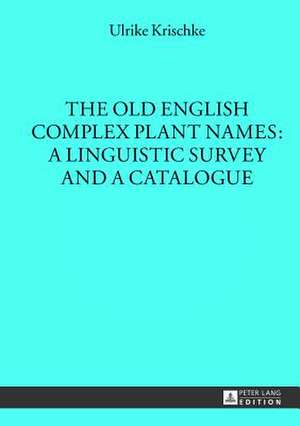The Old English Complex Plant Names: A Linguistic Survey and a Catalogue: Muenchener Universitaetsschriften, cartea 39
Autor Ulrike Krischkeen Limba Engleză Hardback – 9 iul 2013
Preț: 678.35 lei
Preț vechi: 929.25 lei
-27% Nou
Puncte Express: 1018
Preț estimativ în valută:
129.82€ • 135.03$ • 107.17£
129.82€ • 135.03$ • 107.17£
Carte tipărită la comandă
Livrare economică 14-28 aprilie
Preluare comenzi: 021 569.72.76
Specificații
ISBN-13: 9783631642696
ISBN-10: 3631642695
Pagini: 486
Dimensiuni: 150 x 211 x 36 mm
Greutate: 0.73 kg
Editura: Peter Lang Gmbh, Internationaler Verlag Der W
Seria Muenchener Universitaetsschriften
ISBN-10: 3631642695
Pagini: 486
Dimensiuni: 150 x 211 x 36 mm
Greutate: 0.73 kg
Editura: Peter Lang Gmbh, Internationaler Verlag Der W
Seria Muenchener Universitaetsschriften
Notă biografică
Ulrike Krischke received her PhD in English Historical Linguistics and Literature of the Middle Ages at the Ludwig-Maximilians-University of Munich in 2010. Since 2006, she has been a lecturer and research assistant at the Department of English and American Studies of the Ludwig-Maximilians-University of Munich.
Cuprins
Contents: Old English complex plant names ¿ Taxon, natural kind term, lexeme? ¿ Plant world, plant names and the Anglo-Saxon medico-botanical texts ¿ Folk taxonomy and scientific taxonomy ¿ Morphology and word-formation ¿ Semantics ¿ Associative relations ¿ Motivations ¿ Diachronic stratification and the effects of language contact ¿ Latin loan influence.








